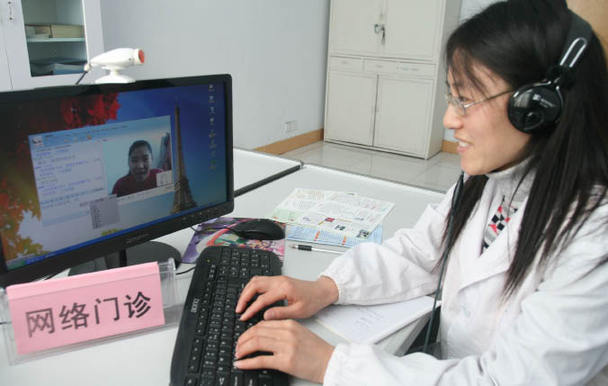IT Transforms Medical Services
|
 |
|
Dr. Zhang Ling uses online video messaging to hold a consultation with a pregnant woman Zhu Honglian. |
Seeing Doctors Online
By the end of 2013, more than 2,000 medical-care apps were in use in China, with over 500 companies developing such programs. The most used app is Doctor Spring Rain, a mobile app that enables users to describe their medical condition to professionals for free consultations.
Wang Rui, a clerk with a media company, is a user of this program. “By clicking on a certain part of the human body shown on the screen, you see a list of symptoms. Your selection then leads you to possible causes and related treatments. If you cannot fix on definite answers about your condition, you could take your case to one of the over 5,000 doctors at top-rate hospitals across China via voice messaging or photos,” Wang explains.
Doctor Spring Rain was developed by Beijing Spring Rain Software Co., Ltd. Founded in mid-2011, the company runs a mobile health database, whose feeds are all attributed to authoritative medical canons and official databases. Users have now topped 20 million. This app involves over 15,000 doctors with leading and Class-Two hospitals across China, who field 25,000-plus health-related questions on a daily basis.
“Daily visits to the Doctor Spring Rain platform outnumber those of any Chinese hospital. And a reply is to be expected within 30 minutes of receiving the question,” said Spring Rain CEO Zhang Rui. “Once a question is raised, our system first forwards it to a doctor in the relevant division who is free. Doctors are recompensed on the basis of user evaluations. This is how you can expect prompt replies even at midnight.”
Another advantage of the app, Zhang said, is that it relieves pressure on star hospitals like the Peking Union Medical College Hospital, by diverting some patients to less-visited Class-Two hospitals. “What we do is tap into the resources of available doctors, mobilizing them to provide services online,” Zhang said, adding that 95 percent or more cases brought into doctors’ offices are not complicated, with solutions possible through online interaction. This is what Spring Rain specializes in – diagnosis of minor ailments and health consultations.
The Internet has also significantly boosted interaction between doctors and patients. Under current laws in China, a licensed health care worker must practice at an actual (not virtual) medical institution. This rules out online hospitals. But thanks to information technologies, patient information about previous visits to different stationary hospitals has become available, accessible through the computer or handset of a physician a person consults, in person or online. For many conditions, such information, along with online communication, is sufficient for a doctor to come up with targeted solutions without meeting a patient face to face.
